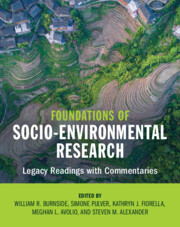Book contents
- Frontmatter
- Dedication
- Contents
- Contributors
- Foreword
- Acknowledgments
- Introduction
- Part I Early Classics of Socio-Environmental Research
- Part II The Roots of Socio-Environmental Research in Geography and Anthropology
- Part III Socio-Environmental Research in Economics, Sociology, and Political Science
- Part IV Socio-Environmental Research in Ecology
- Part V Ethical, Religious, and Historical Approaches to Socio-Environmental Research
- Part VI Technology, Energy, Materials, and Socio-Environmental Research
- Conclusion
Part II - The Roots of Socio-Environmental Research in Geography and Anthropology
Published online by Cambridge University Press: 18 November 2022
- Frontmatter
- Dedication
- Contents
- Contributors
- Foreword
- Acknowledgments
- Introduction
- Part I Early Classics of Socio-Environmental Research
- Part II The Roots of Socio-Environmental Research in Geography and Anthropology
- Part III Socio-Environmental Research in Economics, Sociology, and Political Science
- Part IV Socio-Environmental Research in Ecology
- Part V Ethical, Religious, and Historical Approaches to Socio-Environmental Research
- Part VI Technology, Energy, Materials, and Socio-Environmental Research
- Conclusion
Summary
Early research in anthropology and geography focused on the diversity of societies and cultures. Semple considered the land basis of societies, from hunter-gatherers to modern nation states. As against this environmental determinism, Boas argued that geography can modify and constrain culture but not create it. Rappaport showed how ritual can regulate, through feedback, the balance of broader ecosystems. Reflecting on work in the Amazon, Moran argued that socio-environmental debates reflect different levels of analysis. Humans altered human–environment relationships by domesticating plants and animals during the Neolithic revolution, as described by Childe. Mumford explores the evolution of cities and suburbs, including the separation of people from resources and urban pollution. We assume modern life affords leisure, but Sahlins shows the affluence of hunter-gatherers given lower environmental demands. How society adapts to natural hazards is explored by White, while Blaikie and Brookfield pioneer political ecology by showcasing the cycle of poverty and land degradation. Sustainable livelihoods require emphasis on equity and capabilities, argue Chambers and Conway.
- Type
- Chapter
- Information
- Foundations of Socio-Environmental ResearchLegacy Readings with Commentaries, pp. 123 - 132Publisher: Cambridge University PressPrint publication year: 2022



